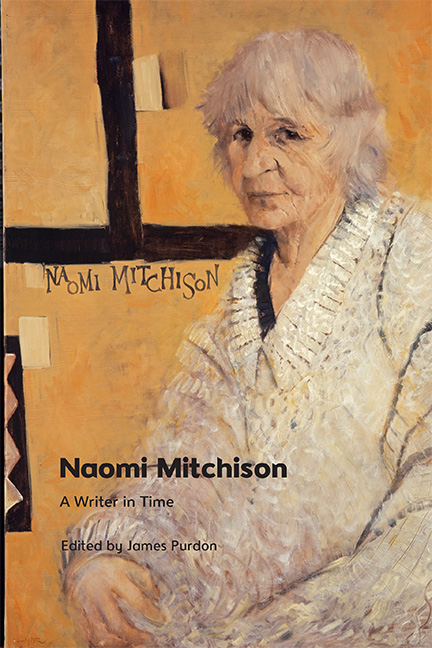Book contents
- Frontmatter
- Contents
- Acknowledgements
- Notes on Contributors
- Introduction
- 1 Naomi Mitchison’s Interwar Short Stories
- 2 ‘She had her hand on the plow’: Shame, Uncertainty and Transformation in The Corn King and the Spring Queen
- 3 Varieties of Sexual Experience: Naomi Mitchison, Mysticism and Gerald Heard
- 4 Scientific Temporalities in We Have Been Warned and ‘Beyond This Limit’
- 5 Send in the Clones? Naomi Mitchison and the Politics of Reproduction and Motherhood
- 6 From Argyll with Love: Naomi Mitchison and the Soviet Union
- 7 Fire or Blood? Aestheticising Resistance in Naomi Mitchison’s The Blood of the Martyrs
- 8 ‘The summoning urgent thing’: The Bull Calves and the Drive to Experiment at Mid-Century
- 9 Mitchison, Decolonisation and African Modernity
- Naomi Mitchison’s ‘Europe’
- Europe
- Bibliography
- Index
9 - Mitchison, Decolonisation and African Modernity
Published online by Cambridge University Press: 18 November 2023
- Frontmatter
- Contents
- Acknowledgements
- Notes on Contributors
- Introduction
- 1 Naomi Mitchison’s Interwar Short Stories
- 2 ‘She had her hand on the plow’: Shame, Uncertainty and Transformation in The Corn King and the Spring Queen
- 3 Varieties of Sexual Experience: Naomi Mitchison, Mysticism and Gerald Heard
- 4 Scientific Temporalities in We Have Been Warned and ‘Beyond This Limit’
- 5 Send in the Clones? Naomi Mitchison and the Politics of Reproduction and Motherhood
- 6 From Argyll with Love: Naomi Mitchison and the Soviet Union
- 7 Fire or Blood? Aestheticising Resistance in Naomi Mitchison’s The Blood of the Martyrs
- 8 ‘The summoning urgent thing’: The Bull Calves and the Drive to Experiment at Mid-Century
- 9 Mitchison, Decolonisation and African Modernity
- Naomi Mitchison’s ‘Europe’
- Europe
- Bibliography
- Index
Summary
The social and psychological consequences of empire and colonisation are a consistent theme of Naomi Mitchison’s fiction. In her first novel, The Conquered (1923), Gallic resistance to Roman occupation in the first century bc serves as an effective if none-too-subtle allegory for the condition of twentieth-century Ireland under British rule. In The Blood of the Martyrs (1939), the Roman empire under Nero is an economic vampire, ‘suck[ing] the blood’ of its provinces in Greece and northern Europe. And in The Bull Calves (1947), the refugee Jacobite Black William becomes intimately acquainted with Britain’s own colonial exploitation – in his words, ‘our cheatery’ – of the Indigenous inhabitants of North America. Born into the upper echelons of the British ruling class, Mitchison felt very keenly the implications of that our. For the first half of her life, the British empire was indisputably a major world power. At home, young Naomi absorbed and internalised the strong opinions of her mother, ‘an active and constant propagandist’, as she would later put it, ‘for Tory imperialism’. (Her father, though more liberal, tended to avoid the subject of politics.) Yet as an adult, Mitchison herself would become a committed and outspoken anti-imperialist who, even as she recognised the effects of her mother’s influence, was capable many decades later of feeling ‘ashamed and embarrassed’ at the pro-empire sentiments recorded in her childhood diaries.
Towards the end of the 1950s, Mitchison began to take an active and energetic interest in present-day anti-colonial politics, with a particular interest in sub-Saharan Africa. No longer content to filter contemporary events through historical analogies, she became a vocal critic of apartheid, and a consistent advocate for Black African self-government throughout the region. In 1960, while hosting a British Council delegation at her home in Carradale, she struck up a friendship with a young delegate from the British protectorate of Bechuanaland, Linchwe, who a few years later would take up his hereditary role as kgosi, or chief, of the Bakgatla people. Linchwe would become a regular guest in Argyll, and Mitchison in turn accepted his invitation to visit Mochudi, the home settlement of the Bakgatla, in Bechuanaland (soon to gain independence from British rule as the Republic of Botswana).
- Type
- Chapter
- Information
- Naomi MitchisonA Writer in Time, pp. 135 - 148Publisher: Edinburgh University PressPrint publication year: 2023



